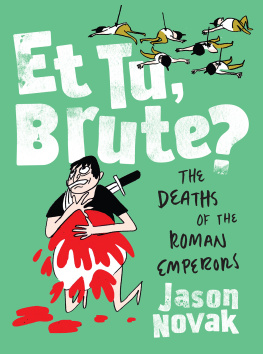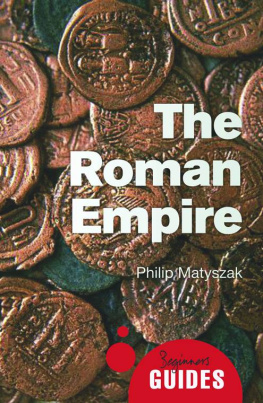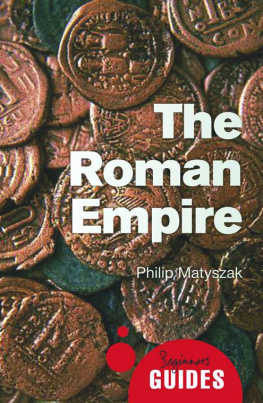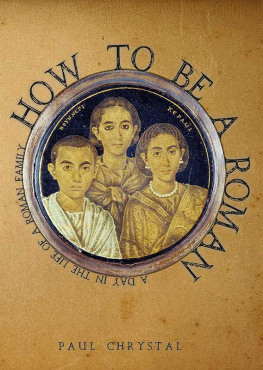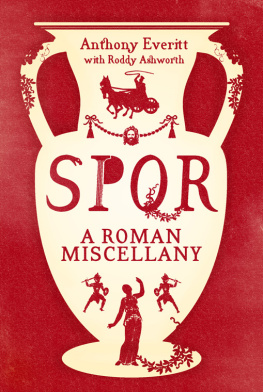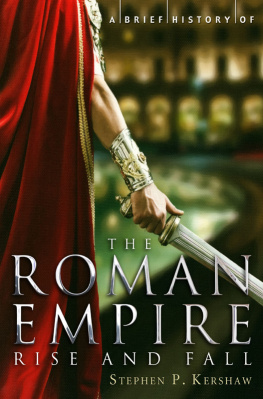INVISIBLE ROMANS
INVISIBLE ROMANS
Prostitutes, outlaws, slaves, gladiators, ordinary men and
women the Romans that history forgot
ROBERT KNAPP

First published in Great Britain in 2011 by
PROFILE BOOKS LTD
3A Exmouth House
Pine Street London ECIR OJH
www.frofilebooks.com
Copyright Robert Knapp, 2011
1 3 5 7 9 10 8 6 4 2
Printed and bound in Great Britain by
Clays, Bungay, Suffolk
The moral right of the author has been asserted.
All rights reserved. Without limiting the rights under copyright reserved above, no part
of this publication may be reproduced, stored or introduced into a retrieval system, or
transmitted, in any form or by any means (electronic, mechanical, photocopying, recording
or otherwise), without the prior written permission of both the copyright owner and the
publisher of this book.
A CIP catalogue record for this book is available from the British Library.
ISBN 978 1 84668 401 2
elSBN 978 1 84765 447 2
The paper this book is printed on is certified by the 1996 Forest Stewardship
Council A.C. (FSC). It is ancient-forest friendly. The printer holds FSC chain of custody SGS-COC-2061

CONTENTS
Introduction
SEEING THE INVISIBLE
I SEEK TO UNCOVER and understand what life was like for the great mass of people who lived in Rome and its empire from the time of Augustus at the start of the first millennium to the accession of Con-stantine three centuries later. For the history of Greece and Rome, the British classical historian Michael Crawford writes in his guide to ancient sources, there is a great deal which is simply unknowable. Evidence is uneven and often difficult to interpret. Scholars energetically debate how far the Roman world can be known. The world of the twenty-first century differs in numberless ways from the world of ancient Rome, not least in our attitudes and assumptions. Given what little evidence of everyday Roman life survives, the ordinary Romans begin to seem irretrievably invisible.
But we need not despair. We can, for example, supplement the evidence from our chosen time period with some careful use of sources before and beyond it. Ancient cultures were more stable than our own. The continuity of agrarian culture and economy in the ancient world makes it likely that people generally behaved in much the same way, not through contact and sharing, but because they had the same struggles for survival. The focus of this book is not merely on the city of Rome but on the whole of the Roman world. One might think the Latin-speaking parts more Roman than those where other languages predominated, but neither sources nor logic suggest this was so. We can find much useful evidence from the mostly Greek-speaking part of the empire, especially from Egypt. As well as containing revealing observations of life in the country, much of it is concerned (as we will be) with urban life; the experience of living in cities and towns, often founded or ruled in Roman patterns, encouraged many common attitudes. This is not to deny the huge variety of cultures in the empire, nor to claim that every person would think and behave in just such a way. But likenesses in attitudes and behavior make it reasonable to use evidence from scattered sources so long as our questions are formulated with care and our answers subject to critical scrutiny.
If we can begin to overcome the difficulties of time and space, we have still to confront the most challenging aspect of the evidence. This is simple and simply put. What survives was generally created by or for the rich and the powerful, and hides the actions and perspectives of any but their own class. As the elite historian Ammianus Marcellinus aptly puts it:
There are many things which are irrelevant to the underlying themes of history, itself accustomed to deal with the highpoints of affairs. Its role is not to investigate the minor details of unimportant circumstances. If someone wished to do that, he might as well try to count the tiny bodies coursing through space, the atoms, as we call them. (Roman History 26.1.1)
The historian can thus write with least difficulty about what the elite Romans cared about, such as politics and war, and the issues they talked about, such as the making and enforcement of law, philosophy, aesthetics, and the inevitability of a social structure that held them at its pinnacle. Many books on these topics appear every year, but the sources, so dear to the heart of Roman historians, do more to obscure than reveal what were after. Ancient evidence comes in two types: the one intentionally provided and the other incidentally. The first is generally irrelevant to our purpose, but the second can be crucial. An elite author setting out, for example, to write on the Roman wars of expansion, will sometimes include contextual details and bits of information which, when combined with other evidence, begin to create a picture of ordinary people. The experience of ordinary people has no direct voice in the histories the Romans have left us. Yet sometimes it is possible to garner insights into the lives of the invisible people even where none was intended and to amplify these by deploying perspectives and evidence from a variety of other sources.
I have searched for a term to capture the invisible demographic group that is the subject of this book and have chosen to call them ordinary people. This distinguishes them from the elite and leaves their definition open to the wide range of their existence, from fairly wealthy to modestly well-off and downright poor, male and female, slave and free, law-abiding and outlaw. These ordinary people lived in a world dominated by a tiny, self-perpetuating elite that was limited and defined by wealth, tradition, blood, and power. They belonged to one of the three orders or ordines into which they divided themselves. The senatorial order was the most exalted in social and political terms but not always the wealthiest. The equestrian order focused on the acquisition of wealth rather than the power and rank of the senatorial order. The decurial order ran towns and cities across the empire and mirrored the senatorial-equestrian divisions of Rome; these men were generally less wealthy than members of senatorial-equestrian orders, although sometimes local decurials were also equestrians. The three orders amounted to no more than 100,000200,000 people, less than half a percent of the empires population of 5060 million. Among them only the adult males counted; these numbered about 40,000 and so, as the empire at this time was roughly 2.5 million square miles, there was on average one adult member of the male elite for every sixty or so square miles. As the elites were concentrated in Rome, the proportion elsewhere was even lower. Yet these numerically minuscule and widely scattered leaders controlled almost everything. Though they are not the direct concern of the present project, we shall need to bear in mind their impact on the other 99.5 percent.
The chapters that follow divide the invisible people into various groups, some less mutually exclusive than others; there are separate chapters, for example, on ordinary men and soldiers and on ordinary women and prostitutes, though most of the latter were female. The aim will be to get, so far as we can, inside the minds of these different people: what attitudes and outlooks they had, what fears haunted and what hopes inspired them. David Potter, an American classical historian writes, There can be no universal definition of history or the historical process that does not allow for the ultimately subjective selection of both evidence and presentation. In this book, I make choices and value judgments as I weave disparate threads into tapestries of what life for ordinary Romans was all about. Creating a readable and revealing account of the neglected majority in a great empire was an exciting challenge to undertake. I hope the reader will enjoy the fascinating panorama of invisible people made visible at last.
Next page


